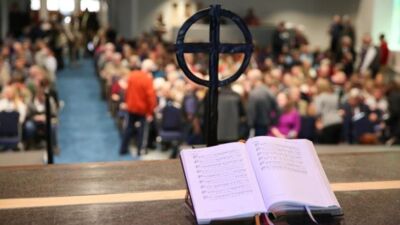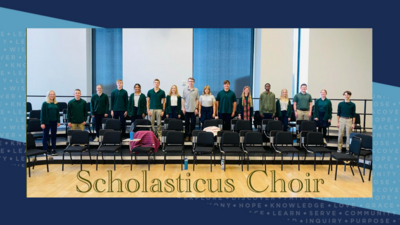Inside the Institutes: Concordia Nebraska’s Institute for Religious Education works to enhance the effectiveness of Christian education in the church

The Institute for Religious Education (IRE) is one of Concordia Nebraska’s institutes that address specific needs on the university’s campus and beyond. For 18 years, it has been working to enhance the quality and efficacy of Christian education in the parish setting by holding conferences, conducting research and providing free educational resources.
Dr. Mark Blanke, professor of education emeritus, is the director of the IRE. He said that the institute was founded as a component of the sabbatical he was granted in 2006.
“The need for such an institute emerged from years of observing congregational educational efforts that were often ineffective and developed without a clear purpose or plan,” he said.
The IRE’s research into congregational education began shortly after its founding, with a survey completed by 200 Lutheran Church-Missouri Synod congregations across the U.S. This survey provided the IRE with valuable information regarding the state of education in the church and offered them insight on where to direct their future efforts.
“Deliberate and careful study of God’s Word is an expectation that God has prioritized for all Christians,” Blanke said. “Additionally, research is clear that effective educational efforts are vital to the development of faith maturity.”
Deliberate and careful study of God’s Word is an expectation that God has prioritized for all Christians and His expectation for His church.
Other research projects have included a 2016 study to determine whether a correlation existed between educational practices known to be effective and whether congregational leaders described the congregation as “healthy.” A correlation did indeed exist - congregations that practiced specific educational practices were significantly more likely to identify as "healthy" and exhibited characteristics such as decreased conflict, congregational growth and increased participation of adults in educational opportunities. In 2024, the institute distributed a survey about these educational practices.
“Over 1300 responses were received [to this survey] and the results informed the IRE’s three-year Adult Education Project,” said Blanke.
This Adult Education Project, he said, is the institute’s initiative for the years 2025-27 and will culminate with free resources for churches that outline the “characteristics of a maturing Christian” as well as methods for assessing their congregants for these characteristics and improving them in congregants.
Simultaneously, the IRE is focusing on building its endowment; right now, the institute’s endowment has a value of over $500,000, but Blanke said that it has set a goal to reach a million dollars by 2035. Each year, around $23,000 of this fund becomes available for the institute’s use. He added that the IRE encourages interested parties to consider contributing to the institute prayerfully through the building of its endowment.
“Please make use of the resources that the IRE provides,” he said. “Share with us when you find things that work well in your church so that we can share that information with a wider audience. Keep our efforts, and those of everyone who seeks to make Christian education a priority that is intentional and effective, in your prayers. Finally, please consider donating to build our endowment so we can make a bigger impact for Christ’s church.”
The Institute for Religious Education continues the centuries-old mission of Martin Luther, who was a “champion of prioritizing Christian education in the church.” It has offered three conferences over the course of its existence to enable church leaders to bring these educational efforts back to their own churches. The 2016 conference focused on Christian education in response to shifting societal stressors, the 2018 conference on “equipping the saints” through effective Christian instruction and the 2023 conference on developing “authentic community” in a post-pandemic environment.
“Research is clear that effective educational efforts are vital to the development of faith maturity, enhancing congregational and denominational loyalty, can help to reduce congregational conflict, correlate with “healthy” congregational characteristics like numerical growth and member retention and aligns with enhanced philanthropic giving,” Blanke said. “As churches seek to ‘make disciples,’ they must prioritize the intentionality and effectiveness of their educational efforts.”
Concordia Nebraska’s institutes provide outreach, service and educational opportunities that align and advance the university’s mission and vision by engaging audiences beyond the campus while serving as a resource to the church at large. Learn more about institutes here.
Interested in Concordia University, Nebraska's institutes?


